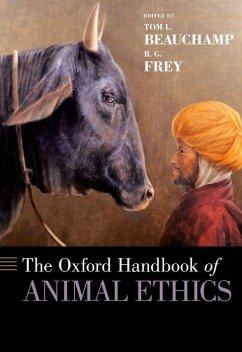Oxford Handbook of Animal Ethics
Herausgeber: Beauchamp, Tom L; Frey, R G
Oxford Handbook of Animal Ethics
Herausgeber: Beauchamp, Tom L; Frey, R G
- Gebundenes Buch
- Merkliste
- Auf die Merkliste
- Bewerten Bewerten
- Teilen
- Produkt teilen
- Produkterinnerung
- Produkterinnerung
Humans encounter and use animals in a stunning number of ways. The nature of these animals and the justifiability or unjustifiabilitly of human uses of them are the subject matter of this volume.
Andere Kunden interessierten sich auch für
![Companion Animal Ethics Companion Animal Ethics]() Clare PalmerCompanion Animal Ethics55,99 €
Clare PalmerCompanion Animal Ethics55,99 €![Animal Minds Animal Minds]() Marta HalinaAnimal Minds68,99 €
Marta HalinaAnimal Minds68,99 €![In Nature's Interests? In Nature's Interests?]() Gary E. VarnerIn Nature's Interests?35,99 €
Gary E. VarnerIn Nature's Interests?35,99 €![Why Vegan? Why Vegan?]() Peter SingerWhy Vegan?12,99 €
Peter SingerWhy Vegan?12,99 €![The Oxford Handbook of Practical Ethics The Oxford Handbook of Practical Ethics]() Hugh LaFollette (ed.)The Oxford Handbook of Practical Ethics87,99 €
Hugh LaFollette (ed.)The Oxford Handbook of Practical Ethics87,99 €![Animals, Robots, Gods Animals, Robots, Gods]() Webb KeaneAnimals, Robots, Gods8,99 €
Webb KeaneAnimals, Robots, Gods8,99 €![Philosophy, Animality and the Life Sciences Philosophy, Animality and the Life Sciences]() Wahida KhandkerPhilosophy, Animality and the Life Sciences127,99 €
Wahida KhandkerPhilosophy, Animality and the Life Sciences127,99 €-
-
-
Humans encounter and use animals in a stunning number of ways. The nature of these animals and the justifiability or unjustifiabilitly of human uses of them are the subject matter of this volume.
Produktdetails
- Produktdetails
- Verlag: Oxford University Press
- Seitenzahl: 998
- Erscheinungstermin: 1. Oktober 2011
- Englisch
- Abmessung: 250mm x 175mm x 57mm
- Gewicht: 1863g
- ISBN-13: 9780195371963
- ISBN-10: 0195371968
- Artikelnr.: 33252465
- Herstellerkennzeichnung
- Libri GmbH
- Europaallee 1
- 36244 Bad Hersfeld
- gpsr@libri.de
- Verlag: Oxford University Press
- Seitenzahl: 998
- Erscheinungstermin: 1. Oktober 2011
- Englisch
- Abmessung: 250mm x 175mm x 57mm
- Gewicht: 1863g
- ISBN-13: 9780195371963
- ISBN-10: 0195371968
- Artikelnr.: 33252465
- Herstellerkennzeichnung
- Libri GmbH
- Europaallee 1
- 36244 Bad Hersfeld
- gpsr@libri.de
Tom L. Beauchamp is Professor of Philosophy, Georgetown University and Senior Research Scholar, Kennedy Institute of Ethics R. G. Frey is Professor of Philosophy, Bowling Green State University
* Preface
* Contributors
* Introduction
* PART I. HISTORY OF PHILOSOPHY
* 1: Animals in Classical and Late Antique Philosophy
* 2: Animals and Ethics in the History of Modern Philosophy
* PART II. TYPES OF ETHICAL THEORY
* 3: Interacting with Animals: A Kantian Approach
* 4: Virtue Ethics and the Treatment of Animals
* 5: A Humean Account of the Status and Character of Animals
* 6: Rights Theory and Animal Rights
* 7: The Capabilities Approach and Animal Entitlements
* PART III. MORAL STATUS AND PERSON THEORY
* 8: The Idea of Moral Standing
* 9: Animals, Fundamental Moral Standing, and Speciesism
* 10: Human Animals and Nonhuman Persons
* 11: Are Nonhuman Animals Persons?
* PART IV. ANIMAL MINDS AND THEIR MORAL SIGNIFICANCE
* 12: Animal Mentality: Its Character, Extent, and Moral Significance
* 13: Mindreading and Moral Significance in Nonhuman Animals
* 14: Minimal Minds
* 15: Beyond Anthropomorphism: Attributing Psychological Properties to
Animals
* 16: The Relationship between Cognitive Sophistication and Pain in
Animals
* 17: Animals that Act for Moral Reasons
* 18: The Moral Life of Animals
* PART V. SPECIES AND THE ENGINEERING OF SPECIES
* 19: On the Origin of Species Notions and Their Ethical Limitations
* 20: On the Nature of Species and the Moral Significance of their
Extinction
* 21: Are All Species Equal?
* 22: Genetically Modified Animals: Should There Be Limits to
Engineering the Animal Kingdom?
* 23: Human/Nonhuman Chimeras: Assessing the Issues
* PART VI. PRACTICAL ETHICS
* 24: The Moral Relevance of the Distinction between Domesticated and
Wild Animals
* 25: The Moral Significance of Animal Pain and Animal Death
* 26: The Ethics of Confining Animals: From Farms to Zoos to Human
Homes
* 27: Keeping Pets
* 28: Animal Experimentation in Biomedical Research
* 29: The Application of Biotechnology to Animals in Agriculture
* 30: Environmental Ethics, Hunting, and the Place of Animals
* 31: Vegetarianism
* 32: The Use of Animals in Toxicological Research
* 33: What's Ethics Got to Do with It? The Roles of Government
Regulation in Research-Animal
* Protection
* 34: Literary Works and Animal Ethics
* Index
* Contributors
* Introduction
* PART I. HISTORY OF PHILOSOPHY
* 1: Animals in Classical and Late Antique Philosophy
* 2: Animals and Ethics in the History of Modern Philosophy
* PART II. TYPES OF ETHICAL THEORY
* 3: Interacting with Animals: A Kantian Approach
* 4: Virtue Ethics and the Treatment of Animals
* 5: A Humean Account of the Status and Character of Animals
* 6: Rights Theory and Animal Rights
* 7: The Capabilities Approach and Animal Entitlements
* PART III. MORAL STATUS AND PERSON THEORY
* 8: The Idea of Moral Standing
* 9: Animals, Fundamental Moral Standing, and Speciesism
* 10: Human Animals and Nonhuman Persons
* 11: Are Nonhuman Animals Persons?
* PART IV. ANIMAL MINDS AND THEIR MORAL SIGNIFICANCE
* 12: Animal Mentality: Its Character, Extent, and Moral Significance
* 13: Mindreading and Moral Significance in Nonhuman Animals
* 14: Minimal Minds
* 15: Beyond Anthropomorphism: Attributing Psychological Properties to
Animals
* 16: The Relationship between Cognitive Sophistication and Pain in
Animals
* 17: Animals that Act for Moral Reasons
* 18: The Moral Life of Animals
* PART V. SPECIES AND THE ENGINEERING OF SPECIES
* 19: On the Origin of Species Notions and Their Ethical Limitations
* 20: On the Nature of Species and the Moral Significance of their
Extinction
* 21: Are All Species Equal?
* 22: Genetically Modified Animals: Should There Be Limits to
Engineering the Animal Kingdom?
* 23: Human/Nonhuman Chimeras: Assessing the Issues
* PART VI. PRACTICAL ETHICS
* 24: The Moral Relevance of the Distinction between Domesticated and
Wild Animals
* 25: The Moral Significance of Animal Pain and Animal Death
* 26: The Ethics of Confining Animals: From Farms to Zoos to Human
Homes
* 27: Keeping Pets
* 28: Animal Experimentation in Biomedical Research
* 29: The Application of Biotechnology to Animals in Agriculture
* 30: Environmental Ethics, Hunting, and the Place of Animals
* 31: Vegetarianism
* 32: The Use of Animals in Toxicological Research
* 33: What's Ethics Got to Do with It? The Roles of Government
Regulation in Research-Animal
* Protection
* 34: Literary Works and Animal Ethics
* Index
* Preface
* Contributors
* Introduction
* PART I. HISTORY OF PHILOSOPHY
* 1: Animals in Classical and Late Antique Philosophy
* 2: Animals and Ethics in the History of Modern Philosophy
* PART II. TYPES OF ETHICAL THEORY
* 3: Interacting with Animals: A Kantian Approach
* 4: Virtue Ethics and the Treatment of Animals
* 5: A Humean Account of the Status and Character of Animals
* 6: Rights Theory and Animal Rights
* 7: The Capabilities Approach and Animal Entitlements
* PART III. MORAL STATUS AND PERSON THEORY
* 8: The Idea of Moral Standing
* 9: Animals, Fundamental Moral Standing, and Speciesism
* 10: Human Animals and Nonhuman Persons
* 11: Are Nonhuman Animals Persons?
* PART IV. ANIMAL MINDS AND THEIR MORAL SIGNIFICANCE
* 12: Animal Mentality: Its Character, Extent, and Moral Significance
* 13: Mindreading and Moral Significance in Nonhuman Animals
* 14: Minimal Minds
* 15: Beyond Anthropomorphism: Attributing Psychological Properties to
Animals
* 16: The Relationship between Cognitive Sophistication and Pain in
Animals
* 17: Animals that Act for Moral Reasons
* 18: The Moral Life of Animals
* PART V. SPECIES AND THE ENGINEERING OF SPECIES
* 19: On the Origin of Species Notions and Their Ethical Limitations
* 20: On the Nature of Species and the Moral Significance of their
Extinction
* 21: Are All Species Equal?
* 22: Genetically Modified Animals: Should There Be Limits to
Engineering the Animal Kingdom?
* 23: Human/Nonhuman Chimeras: Assessing the Issues
* PART VI. PRACTICAL ETHICS
* 24: The Moral Relevance of the Distinction between Domesticated and
Wild Animals
* 25: The Moral Significance of Animal Pain and Animal Death
* 26: The Ethics of Confining Animals: From Farms to Zoos to Human
Homes
* 27: Keeping Pets
* 28: Animal Experimentation in Biomedical Research
* 29: The Application of Biotechnology to Animals in Agriculture
* 30: Environmental Ethics, Hunting, and the Place of Animals
* 31: Vegetarianism
* 32: The Use of Animals in Toxicological Research
* 33: What's Ethics Got to Do with It? The Roles of Government
Regulation in Research-Animal
* Protection
* 34: Literary Works and Animal Ethics
* Index
* Contributors
* Introduction
* PART I. HISTORY OF PHILOSOPHY
* 1: Animals in Classical and Late Antique Philosophy
* 2: Animals and Ethics in the History of Modern Philosophy
* PART II. TYPES OF ETHICAL THEORY
* 3: Interacting with Animals: A Kantian Approach
* 4: Virtue Ethics and the Treatment of Animals
* 5: A Humean Account of the Status and Character of Animals
* 6: Rights Theory and Animal Rights
* 7: The Capabilities Approach and Animal Entitlements
* PART III. MORAL STATUS AND PERSON THEORY
* 8: The Idea of Moral Standing
* 9: Animals, Fundamental Moral Standing, and Speciesism
* 10: Human Animals and Nonhuman Persons
* 11: Are Nonhuman Animals Persons?
* PART IV. ANIMAL MINDS AND THEIR MORAL SIGNIFICANCE
* 12: Animal Mentality: Its Character, Extent, and Moral Significance
* 13: Mindreading and Moral Significance in Nonhuman Animals
* 14: Minimal Minds
* 15: Beyond Anthropomorphism: Attributing Psychological Properties to
Animals
* 16: The Relationship between Cognitive Sophistication and Pain in
Animals
* 17: Animals that Act for Moral Reasons
* 18: The Moral Life of Animals
* PART V. SPECIES AND THE ENGINEERING OF SPECIES
* 19: On the Origin of Species Notions and Their Ethical Limitations
* 20: On the Nature of Species and the Moral Significance of their
Extinction
* 21: Are All Species Equal?
* 22: Genetically Modified Animals: Should There Be Limits to
Engineering the Animal Kingdom?
* 23: Human/Nonhuman Chimeras: Assessing the Issues
* PART VI. PRACTICAL ETHICS
* 24: The Moral Relevance of the Distinction between Domesticated and
Wild Animals
* 25: The Moral Significance of Animal Pain and Animal Death
* 26: The Ethics of Confining Animals: From Farms to Zoos to Human
Homes
* 27: Keeping Pets
* 28: Animal Experimentation in Biomedical Research
* 29: The Application of Biotechnology to Animals in Agriculture
* 30: Environmental Ethics, Hunting, and the Place of Animals
* 31: Vegetarianism
* 32: The Use of Animals in Toxicological Research
* 33: What's Ethics Got to Do with It? The Roles of Government
Regulation in Research-Animal
* Protection
* 34: Literary Works and Animal Ethics
* Index








